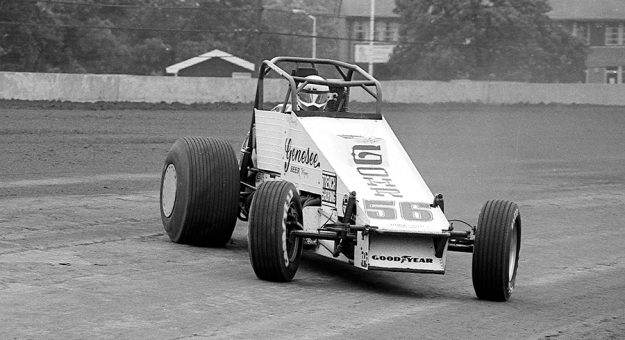It is for this reason that Bob Pankratz took muted pride in the outcome of the July 24, 1949, AAA sprint car race at Salem Speedway. The event will be long remembered for an accident that took the lives of drivers Chick Barbo and Tommy Mattson. Wally Pankratz was there.
“I can close my eyes and still see this,” he said. “We were parked where the trailers were because my mom wouldn‘t watch. We were in our woody wagon and my dad was leaning in talking to my mother and there was this big commotion. Barbo and Mattson‘s car came through the fence and flew over our car into the parking lot.”
It was a somber moment, but Mel Hansen swept the card in the Malloy car and established a track record. For Bob Pankratz there was an element of retribution in this outcome and Hansen‘s victory the following week at Winchester.

“My dad used to say yes, Ruttman was a great driver,” Wally recalled. “But it kind of made him mad that it was seen as all about Ruttman when it was also about the car.”
The fact that Chick Barbo factored in this sad day is also tinged with irony.
On May 9, 1948, the first official AAA national championship midget race was held at the one-mile dirt track at Bainbridge, Ohio. The feature was captured by Chick Barbo in Bob Pankratz‘s No. 32. Unfortunately, Pankratz sustained a devastating head injury in a crash earlier in the race. He remained in a coma for three months. While he was in the hospital, his brother suggested to Dorothy Pankratz that the best course of action was to sell the car. The car became one of the most iconic in midget history. The remarkable tale of this car has been aptly documented, Jimmy Davies driving it to three straight USAC championships beginning in 1960.
Bob Pankratz was never the same. He still had moments of brilliance in the shop and his intellect was intact. Yet, he was irreparably changed. One of the easiest differences to spot was drinking.
“According to my mother, who could be hard on him, he was a completely different person before the accident as far as drinking was concerned,” Wally Pankratz said. “Before the accident Johnnie Parsons, Cal Niday and Duane Carter told me he was a normal social drinker, but after the accident he would have one or two drinks and then go on a binge.”
As a result, Bob Pankratz made frequent trips to California‘s Norwalk State Hospital. Wally remembers visiting his father and listening to his pleas to get him out of the institution because “there are crazy people here.”
Bob Pankratz‘s drinking and mood swings eventually became too much for Dorothy Pankratz and the marriage ended. Wally recalls that his mother, “never denigrated” his father. As he grew older, he began to learn more about what Bob had accomplished and his role in the sport. He knew his dad‘s flaws but understood the precipitating factors, thus he was rightfully proud of him.
However, there were consequences. His mother did everything she could do to drum auto racing out of the soul of her son. Luckily, young Wally had an outlet. He loved football. His family had an early television and nothing captured his attention quite like the gridiron. There was a time where racing and football collided.
“Right at the end of my parent‘s marriage we went to a race at the Orange Show Speedway,” Wally remembered. “The grandstands kind of cantilever over about six feet. It was a fifth-mile track and the football field extended into the race track. This was during football season, so the field was all marked out. After the race was over, I told my dad I wanted to run the whole football field, but he said, ‘No son, we must get out of here. Next time you can do that.‘”
The next time Pankratz visited Orange Show it was as an all-league safety for Garden Grove High School. “I didn‘t realize where we were really going until I walked out on the field and there was that cantilevered grandstand,” Pankratz remembered. “I thought, ‘Oh my God, this is that place.‘ So, my dad was right. The next time I showed up I ran up and down that field.”
His opponent that day was Pacific High School and his assignment was another all-league player who made it all the way to the Indianapolis 500 — David “Swede” Savage.
“I was terrified because he was a big guy and I weighed 150 pounds,” Pankratz noted. “Then, of course, there was the name. Swede Savage. It was like there is a Norseman out there who is going to kill me.”
